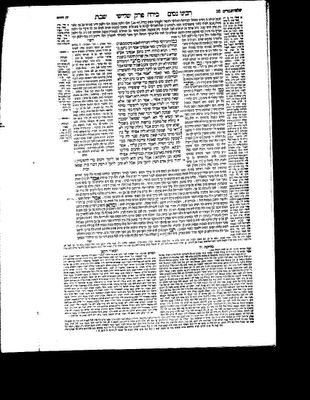
HIDE/SHOW IMAGE
19b
{Shabbat 41a continues}
Gemara:
What is meant by 'IF A MILIARUM IS CLEARED OF ITS] COALS'?
A Tanna taught: the water is within and the coals are without.
{Soncino: It is a large vessel on the outside of which a receptacle for coals is attached. Thus it would be something like the old-type Russian samowar.}
What is an ANTIKI?
Rav Nachman {our gemara: bar Yitzchak} said: [It means a vessel suspended] within a cauldron-like vessel.
{Jastrow: The vacant space beneath being filled with coals.}
There is a brayta in accordance with Rav Nachman: From an antiki, even when cleared of coals and covered with ashes, one may not drink, because its copper heats it.
MISHNA:
IF A BOILER IS REMOVED, ONE MAY NOT POUR COLD WATER THEREIN TO HEAT IT, BUT ONE MAY POUR IT [WATER] THEREIN [THE BOILER] OR INTO A GOBLET IN ORDER TO TEMPER IT.
{Shabbat 41b}
Gemara:
What does this mean?
Abaye said: This is what it means: If a boiler is removed [from the fire] and it contains hot water, one must not pour therein a little water to heat it [the added water], but he may pour a large quantity of [cold] water therein to temper it. But if the water is removed from a boiler, no water at all may be poured therein, because that hardens it {the metal of the boiler}; this agreeing with Rabbi Yehuda Judah, who maintains: [Even] that which is unintentional is forbidden.
Rav said: They taught this only where there is [merely] a sufficient quantity to temper it; but if there is enough to harden it, it is forbidden. Whereas Samuel maintained: Even if there is a sufficient quantity to harden it, it is also permitted {the Rif here follows the gemara's emendation} like Rabbi Shimon who says that that which is unintentional is permitted.
{Shabbat 42a}
And if it is difficult for you this that Shmuel said: "One may extinguish a lump of fiery metal in the street, that it should not harm the public, but not a burning piece of wood" - for if he held like Shmuel, even of wood would also be permitted!
{The answer is:} In that which is unintentional, he holds like Rabbi Shimon, but in an act which is not needed for itself {melacha sheAina tzricha legufa} he holds like Rabbi Shimon who says you are liable for it.
Ravina said: Therefore, a thorn in public ground may be carried away in stages of less than four cubits; whilst in a karmelith even a great distance too {is permitted}. And so is the halacha.
"BUT ONE MAY POUR IT [WATER] THEREIN [THE BOILER] OR INTO A GOBLET IN ORDER TO TEMPER IT":
The Sages learnt {in a brayta}: A man may pour hot water into cold, but not cold water into hot; this is the view of Bet Shammai.
It's been a while...
-
I've been blogging a bit on Substack, at Scribal Error. While focused more
on gemara and girsaot, I just had a post on Rationalism and Midrash. Check
ou...
3 years ago



No comments:
Post a Comment